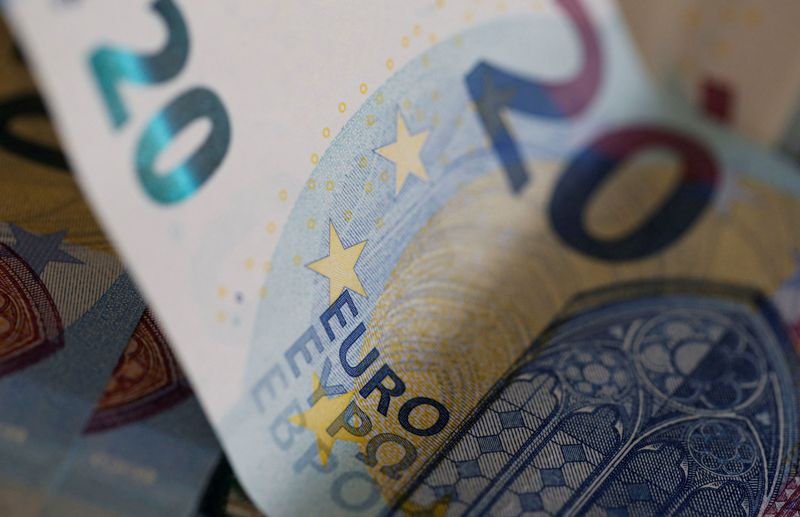By Dhara Ranasinghe and Yoruk Bahceli
LONDON (Reuters) -When euro zone interest rates turned negative in 2014, fixed income specialist Michael Hampden-Turner recalls having to explain to baffled bond investors how they could be charged to lend money to governments.
As central banks sought to help economies through a succession of crises by making it costly to hoard cash rather than put it to work, investors soon found themselves paying many countries - and even some companies - to take their money.
Savers complained that up-ending the practice of charging borrowers interest robbed them of wealth, but by late 2020, 75% of euro zone sovereign debt on Tradeweb's platform - roughly 6.7 trillion euros ($7.45 trillion) - carried negative yields.
Nearly a decade later, Hampden-Turner, previously at Citi and now fixed income director at FTSE Russell, is watching borrowing costs climb back above 0%. Now, his younger colleagues must get their heads around positive yields.
"Previously, it was just getting people familiar with it, and now we've got a whole generation of traders that have never known anything but negative yields," said Hampden-Turner. "All of a sudden that's changing."
More attractive returns could bring investors back to the region and boost the euro, while easing strains on banks and pension funds. Likely losers include riskier emerging and corporate bonds that were snapped up in a hunt for returns.
Money markets see the ECB exiting negative rates by year-end as it tightens policy to tackle soaring inflation.
Less than a third of euro zone debt on Tradeweb's platform now carries a negative yield, while Deutsche Bank (DE:DBKGn) estimates the global pool has shrunk to less than $3 trillion for the first time since December 2015, from a 2020 peak of over $18 trillion.
Yields on German 10-year bonds vaulted above 0% in January for the first time since 2019 and are at 0.6%. Two-year yields turned positive for the first time since 2014 this week.
NEGATIVE VERDICT
Switzerland and Japan also took rates below zero from 2015 in an experimental - and arguably failed - effort to revive inflation and growth.
Blamed for a huge rise in debt and inflating housing and stock market bubbles, negative rates have also been bad news for pension funds and insurers, which use current bond yields to value future liabilities.
Because they cannot make money holding "safe" government bonds, they have been forced take on more risk: a 2019 IMF paper showed large pension plans had doubled allocations to illiquid, alternative assets since 2007.
German insurers whose investment products guarantee an income in old age have been under particular pressure, with regulators requiring they set aside additional reserves since 2011.
For banks, negative rates have hurt profitability by eroding their net interest margins. Euro area bank stocks have slid some 40% since 2014 and Japan's banks 10% since rates there fell below 0% in 2016.
"If ... interest rates are like a guide to banks pricing power, interest rates in Europe have been at a 5,000-year low. So banks' pricing power has been at a 5,000-year low," said Morgan Stanley (NYSE:MS) chief European equity strategist Graham (NYSE:GHM) Secker.
CHANGE IN THE AIR
As short-dated bond yields turned positive this week, euro zone bank shares gained almost 4%.
Each ECB rate hike could add 10% to lenders' earnings-per-share, Secker estimates - and 20% in southern Europe.
A return to positive yields could also bring back capital from higher-yielding assets.
Viktor Hjort, global head of credit strategy at BNP Paribas (OTC:BNPQY), estimates insurance companies owned 30% of European corporate bonds in 2016 but just 22% now, crowded out by the ECB.
A February BofA survey predicted such long-term investors would become the biggest marginal buyer of European credit.
"If you're an insurance fund, the opportunities for investment for you have just expanded drastically," said Helene Jolly, head of EMEA investment-grade corporate debt syndicate at Deutsche Bank.
"Before this it was harder for you to hit targets. You maybe had to go slightly longer than you wanted to, or to a slightly lower credit rating."
Investors are already returning to higher-quality debt.
Thirty-year French and Belgian government bonds saw strong investor demand after yields rose above 1% in January, debt officials noted.
David Gillard, who heads insurance and regulatory strategies at Allianz (DE:ALVG) Global Investors, said the rise in yields "provides insurers that were underweight rates and spread a good valuation point to increase credit market exposures".
Covered bonds, the safest bank debt, and single-A rated corporate debt are among assets attracting insurers, he said.
Such portfolio "de-risking" may hurt assets which benefited from negative yields.
Already "at the margin, (insurance companies) wanted to reduce some of that risk ... particularly from the likes of the emerging market area, that was an area of concern," said Gerard Fitzpatrick, head of fixed income portfolio management at Russell Investments.
But with euro zone rates expected to peak at just over 1% and no sign of hikes in Japan and Switzerland, unwinding could take years, especially as inflation-adjusted yields remain negative, unlike in emerging economies.
"We're not going to have a party and get out the champagne because yields are above zero," said Ludovic Colin, a senior portfolio manager at Swiss asset manager Vontobel.
"What we need to understand is where they are going, not where they are now."
